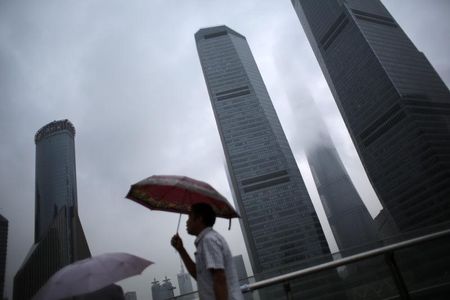By Umesh Desai
HONG KONG (Reuters) - Chinese companies hounded by debt obligations accrued over the past few years are grappling with a new adversary at what is a very inconvenient time: global ratings agencies.
Standard & Poor's and Fitch Ratings have slashed more ratings of Chinese companies in 2014 than a year earlier as towering debts weigh on corporate bottom-lines. The thumbs-down from the agencies will make it harder - and more costly - for companies to borrow at a time when their cash flows are taking a hit from a weakened economy.
Analysts say big companies backed by the Chinese government are less likely to be at risk than smaller, independent firms that had binged on the easy credit springing from a round of government stimulus in 2008-2009.
On Monday, S&P cut the ratings of China Shanshui Cement (HK:0691) and Guangzhou R&F Properties (HK:2777) by a notch, plunging them deeper into junk status. Last week, fellow rating agency Moody's downgraded steelmaker China Oriental , already wallowing in non-investment territory, also by a notch.
"When the economy is deleveraging and credit is not growing as fast as before, they need extra cash to repay debt instead of refinancing it in the market, thereby creating pressure on balance sheets and in some cases on the ratings," said Moody's analyst Ivan Chung.
Data released over the weekend showed factory output grew at its slackest pace in six years in August, stoking fears that China's economy was sliding deeper into a downturn.
Analysts say the steel, metals, chemicals sectors and real estate developers in some cities will find it difficult to raise cash as excess capacity heaps pressure on their credit profiles.
A debt-infused expansion at Guangzhou R&F Properties in a now weaker market and tighter credit environment led S&P to downgrade its rating to BB-minus from BB. Its debt-to-earnings before interest, taxes, depreciation and amortisation (EBITDA) ratio rose to 5.05 at end-2013 from 3.12 in 2011.
S&P also cut China Shanshui Cement to B-plus from BB-minus, saying it expected limited improvement in cash flow because of subdued cement demand on account of the economic slowdown and overcapacity. Its debt-to-EBITDA ratio more than doubled to 4.56 at end-2013 from 2.06 in 2011.
Moody's lowered its rating on China Oriental to B2 from B1, saying reduced lending to the steel industry could hurt access to fresh bank loans.
China Oriental, China Shanshui Cement and Guangzhou R&F Properties did not immediately respond to Reuters requests for comment.
Earlier this month, Fitch cut its outlook on oil and gas field services provider Anton Oilfield to negative from stable, blaming the squeeze on its margins from competition, reduced capital spending by customers in China and a longer working capital cycle that was hurting its cash flow.
Fitch downgraded three Chinese non-financial companies in the year to date - Hengdeli Holdings (HK:3389), Parkson Retail Group (HK:3368) and Zoomlion Heavy (HK:1157) - compared with zero downgrades in China a year earlier.
S&P downgraded 16 Chinese non-financial firms year-to-date, up from 12 a year earlier. Warnings and outlook downgrades to negative increased to 15 instances from 10.
Moody's told Reuters that it could not immediately confirm its ratings actions on such companies or provide more details.
"The pressure on ratings will continue as they rebalance," said Terry Chan, a Melbourne-based S&P analyst. "There has been over-investment in the years past, and the government recognises that the investment driven growth model has run its course. The return on investment will continue to decline and this over-investments will have to be adjusted."
RETAIL, YOU TOO
Traditional sectors like retail are facing pressures not only from the economic slowdown but also from the rapid adoption of internet technology and Beijing's drive against corruption.
"Retail is suffering because of the anti-graft push, the overall weak sentiment and the dominance of online platforms like Taobao and T-Mall," said Kalai Pillay, a Singapore-based analyst with Fitch.
Earlier this year, Fitch cut the rating of China-based department store operator Parkson Retail to BB from BB-plus on account of weaker sales growth and profitability amid a challenging operating environment.
That economic backdrop is unlikely to change in a hurry, and raters expect sustained pressure on credit metrics.
"The leadership is tolerating slower growth for the benefit of rebalancing the economy - short-term pain for long-term benefit," said Hong Kong-based Moody's analyst Clara Lau.
"We expect mildly negative rating pressure to continue for the rest of this year, and it could probably extend to the first half of next year depending on growth targets and policies," she said, referring to selective credit easing by some local governments.
But not all is gloom and doom - some credit ratings are also being raised.

Developer CIFI Holdings (HK:0884) was upgraded to BB-minus from B-plus by Fitch after a strong first-half performance, while Moody's raised Yuzhou Property to B1 from B2. The upgrades reflect the varying fortunes in a highly fragmented sector where borrowers have a wide range of financing strategies.
(Editing by Ryan Woo)
